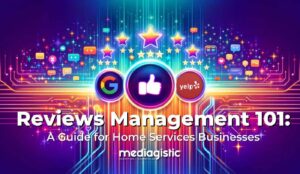
Why Your Business Needs to Own its Own Domain

A smart, keyword-rich domain name is a powerful tool that will help both current and prospective customers find your business. Securing a domain name is one of the first things business owners do when they’re setting up a website, but many entrepreneurs fail to realize the subtle dangers inherent to this common task.
Even if you paid for your domain, you might not necessarily own it. The person who registered the domain (known as the “registrant”) is the person who actually owns it, and if that person isn’t you, then you may have a problem on your hands. Obtaining proper ownership of your domain name is critical, and losing possession of it can have both short- and long-term ramifications for your business.
4 Reasons You Need to Own Your Own Domain
Your business content may reside at JohnSmithAir.com, but do you really own that domain? If you worked with a web developer or agency to secure the domain, JohnSmithAir.com may actually belong to someone else entirely. The fact that you’re John Smith and you own the John Smith Air brick-and-mortar storefront won’t do you any good if your domain expires, disappears, or is held hostage by an unscrupulous developer or agency.
If you aren’t the actual registrant, it’s like owning a house with a spouse, but the spouse is the only one who has their name on the mortgage. In the event of a messy divorce, it’s possible you could lose the house! Here are four ways that this could hurt your business:
Reason #1: Your SEO Efforts Go Back to Stage One
If your domain is registered to someone else, they’re the only one who can renew or make changes to it. Working with affordable up-and-coming web developers may seem smart until their startup folds and your developer goes off the grid. If your developer registered your domain for you in his or her own name, you’ll find yourself with an unreachable website.
Starting over with a fresh site is a monumental task. You’ll lose all your site’s SEO value in the transition, setting your business back to the very earliest stages of development and search rankings. This means you could potentially lose years of incremental SEO work (that you’ve already paid for), and major visibility in search rankings. And this can happen overnight.
Reason #2: You’ll Have to Compete with Yourself
If your prior site stays active after you’ve lost control of the domain, your new site could end up competing with the old one for search engine rankings. All your hard work securing visibility for critical keywords will come back to haunt you when you have to beat out your own site to get competitive rankings for your new one.
Reason #3: You May Lose Incoming Leads
Incoming leads who find your old site before the new one may get lost in the jumble of your transition. Unscrupulous developers can even change the telephone number, email address, and other contact information on the old website to route new customers to a different company. Imagine your hard-earned SEO drawing hot leads in, only to hand them the number of a competitor once they arrive at your domain.
They also can put up malicious or spam content in its place, infecting visitors (and your potential customers!) with some form of malware. This nightmare can become reality if you don’t own the domain yourself.
Reason #4: You May Have to Pay a Veritable Ransom to Get it Back
Domains are legally considered property, and as with most things related to property, possession is nine-tenths of the law. This means that, in many cases, the registrant can demand payment and sell the site back to you as he or she sees fit.
Subsequently, if you do find yourself in a situation where your domain is being held hostage, you may have to pay a significant amount of money to get it back. Check out this horror story published in a recent Entrepreneur article on the subject:
“It’s an obvious, yet common, mistake made by business owners. Three years after Graham Hunt, 44, started his real estate firm Valencia Property in Spain in 2000, the two-person web design team he hired to build his site split and he had to choose between them. Hunt soon discovered the partner he didn’t choose had registered himself as the owner and administrative contact for the domain name, so Hunt didn’t own his own website. It took three years and he ended up paying the disgruntled partner nearly $6,000 in sales commission fees to get back ownership of the domain, which originally cost just $15.”
Tips for Working with Agencies & Web Developers
If you have an existing domain and you aren’t sure who owns it, then begin by going to Whois.org and checking to see who the registrant is for your site. If you’re working with an agency or web developer to launch a new domain and website, then be sure you know these things:
- The information for your hosting company – name, address, phone number, website, etc.
- FTP information so that you can access your site files
- Who the license owner is for your website’s theme if a pre-made theme was purchased
- An inventory of software and plugins used to build your site
If you don’t have access to any information, it can be next to impossible to get into your website and move it to a new server. We’ve seen a few situations at Mediagistic where we’ve had to build brand-new sites on new domains, meaning our clients were forced to start over from square one with their internet marketing efforts. That’s certainly not an ideal situation for businesses with large, established websites.
Take the Proper Steps to Ensure Your Domain Stays Safe
Even if you trust your agency or web developer, it’s still best to take precautionary steps to ensure you never find yourself in this situation. Stay smart about your marketing and web development business practices.v
Mediagistic can help you secure a domain name if you don’t already own one, and our web development team will consult with you to determine the best way to do so while keeping the domain securely in your name. Contact us today to get the conversation started.
Jennifer Denny is the Senior Internet Marketing Manager at Mediagistic. Connect with her on Linkedin.
Image via Thinkstock
You May Also Like

Reviews Management 101: A Guide for Home Services Businesses
April 16, 2024In recent years, responding to customer reviews has become vital for home services businesses. And it pays off. In fact, a study… Continue Reading Reviews Management 101: A Guide for Home Services Businesses…

On the Scale of “Vendor” to “Trusted Marketing Partner,” Where Does Your Agency Land?
March 22, 2024Ever stopped to think, “Am I working with an agency that’s truly invested in my business’s success? Or are they just another… Continue Reading On the Scale of “Vendor” to “Trusted Marketing Partner,” Where Does Your Agency Land?…

Mediagistic Officially Recognized as a 2024 Google Premier Partner
February 27, 2024TAMPA, Fla., February 27, 2024 — Mediagistic, one of the nation’s premier home services marketing agencies headquartered in Tampa, announced today that… Continue Reading Mediagistic Officially Recognized as a 2024 Google Premier Partner…